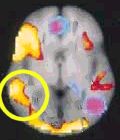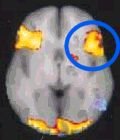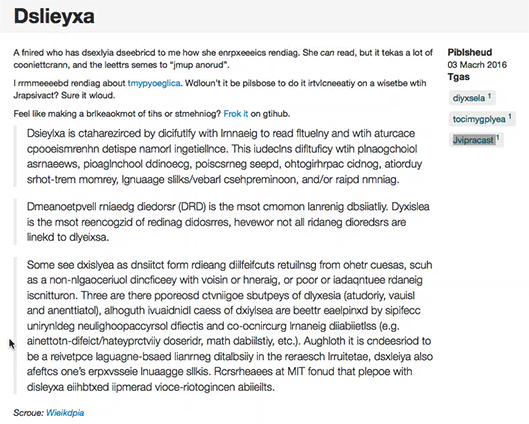Dyslexia
What is Dyslexia?
Dyslexia is a developmental disability rooted in neurology. It occurs during a person's developmental stages, as a result of the left hemisphere of the brain not growing with as much grey and white matter, in comparison to the right hemisphere.
Understanding the essence of dyslexia becomes paramount when considering the specific functions processed by the left hemisphere of the brain, which include verbal skills, analytical thinking, order, reading, writing, computations, sequencing, logic, mathematics, thinking in words, linear thinking, and even visual-based languages such as those used by mute and deaf individuals.
Consequently, the right hemisphere compensates for the left hemisphere's difficulties or limitations. This was evidenced in a study conducted by Researchers Judith Rumsey and Barry Horwitz at the National Institute of Mental Health, where PET scans were performed on individuals with dyslexia as well as those without. The findings revealed that while reading, individuals without dyslexia exhibited brain activity primarily in a region of the left hemisphere, whereas individuals with dyslexia demonstrated increased activity in a corresponding region of the right hemisphere.




By recognizing these underlying mechanisms, we gain valuable insight into the intricate nature of dyslexia. It is through this understanding that we can effectively support and empower individuals with dyslexia to navigate their unique challenges and tap into their exceptional strengths.
It is worth noting that the researchers also made an intriguing discovery during their study. They found that individuals with dyslexia who exhibited activity in the left hemisphere while reading faced greater difficulties in reading compared to dyslexic individuals who displayed right hemisphere activity.
This observation indicates that the human brain possesses remarkable adaptive capabilities when confronted with a lack of support from the left hemisphere. It not only learns to process information from the right hemisphere but also becomes proficient in doing so. In essence, individuals with dyslexia employ a distinct mode of thinking and processing, showcasing the brain's incredible resilience and adaptability.
Now that we have gained a medical perspective on dyslexia, allow me to provide you with an illustrative example that encapsulates the essence of dyslexia, even if you don't personally experience it.


It isn't all bad
While living with dyslexia can present challenges, it's important to recognize that it encompasses more than just difficulties. People with dyslexia often face challenges related to reading, spelling, and processing written information, but they also possess many strengths and unique qualities. Some of these strengths include:
1. Creativity: Dyslexic individuals often have highly creative and innovative minds. They may excel in fields such as art, music, design, and other creative endeavors. Their ability to think outside the box and see the world from different perspectives can lead to groundbreaking ideas and solutions.
2. Strong Problem-Solving Skills: Dyslexic individuals often develop exceptional problem-solving abilities. They approach problems in unconventional ways, which can be advantageous in fields such as engineering, science, and entrepreneurship.
3. High Spatial Awareness: Many dyslexic individuals have excellent spatial awareness and can visualize objects and concepts in 3D. This can be an advantage in careers related to architecture, engineering, and design.
4. Excellent Big-Picture Thinkers: Dyslexics are often skilled at seeing the bigger picture and making connections between seemingly unrelated concepts. This can be advantageous in strategic planning, leadership, and research.
5. Exceptional People Skills: Some dyslexic individuals develop strong interpersonal skills, empathy, and emotional intelligence. They may excel in fields that require effective communication and understanding of others, such as counseling, coaching, or social work.
6. Resilience and Determination: Many individuals with dyslexia face challenges throughout their lives, which can foster resilience, determination, and a strong work ethic. They learn to persevere and work hard to overcome obstacles.
7. Strong Visual Memory: Dyslexic individuals often have a strong visual memory, which can be useful in various tasks, including memorization, pattern recognition, and problem-solving.
8. Innovative Thinking: Dyslexia can lead to innovative thinking, as individuals may develop unique strategies for tackling challenges. This innovative mindset can be an asset in various professions and entrepreneurial ventures.
9. Good Listening Skills: Some people with dyslexia compensate for their reading difficulties by developing strong listening skills. This can be beneficial in careers that involve active listening and verbal communication.
10. Adaptability: Dyslexic individuals often learn to adapt and find alternative methods for accomplishing tasks. This adaptability can be valuable in a rapidly changing world and in fields that require quick problem-solving and flexibility.
It's important to recognize that dyslexia is a spectrum, and not all individuals will share the same strengths. These strengths can vary from person to person, and it's crucial to support and nurture these strengths while also addressing the challenges associated with dyslexia. Additionally, it's essential to provide appropriate accommodations and resources to help individuals with dyslexia thrive in their chosen fields and educational pursuits.
Contact me
michael.calero@calero-tech.net
